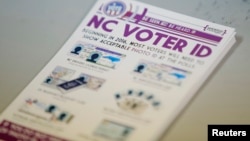U.S. courts have struck down voter identification laws as discriminatory in several states recently, ensuring voting rights for more minority and lower-income voters ahead of November's U.S. presidential election.
On Friday, a federal appeals court struck down a law in North Carolina that required voters to show photo identification before casting ballots. The three-judge panel ruled the law, passed in April, had "discriminatory intent" because it would primarily affect minorities and poor people.
In a statement following the ruling, North Carolina Governor Pat McCrory noted that photo identification is required to purchase some cold medicines and board an airplane, "Yet, three Democratic judges are undermining the integrity of our elections while also maligning our state," he said. "We will immediately appeal and also review other potential options."
But U.S. Attorney General Loretta Lynch praised the ruling, saying, "The ability of Americans to have a voice in the direction of their country ... is fundamental to who we are and who we aspire to be."
A federal judge found that parts of a Wisconsin voter identification law were unconstitutional. In his ruling, the judge said that the law's attempt to prevent a perceived threat of election fraud by requiring photo identification or a lengthy petition process would lead to "real incidents of disenfranchisement ... particularly in minority communities." The judge called the law "a cure worse than the disease."
The ruling is a "huge win not only for the plaintiffs, but for democracy itself," said a spokesman for One Wisconsin, one of the two groups that filed the lawsuit against the measure.
In a tweet, the Wisconsin State Assembly majority leader, Republican Jim Steineke, called the decision "judicial overreaches that usurp states' rights." Governor Scott Walker, also a Republican, said on Twitter that "voting should be easy, but cheating should be hard," and that the ruling would most likely be appealed.
Earlier this month, a Texas photo identification law for voters was ruled discriminatory by a U.S. appeals court. The judge in that case sent the case back to a lower court to decide whether the law was meant to be discriminatory. He also asked the lower court for a short-term solution to be put in place for the November elections.
Other states that have photo identification laws for voters include Georgia, Indiana and Virginia.
Many lack IDs
According to the Brennan Center for Justice at New York University, about 11 percent of American citizens do not have government-issued photo IDs.
Supporters of the photo ID laws say the photo identification is meant to prevent voter fraud. But critics say the laws are a way for conservatives to eliminate votes for the competition, since the poor and members of minorities — the people least likely to have photo IDs — are more likely to vote for a liberal candidate than a conservative one.
In a related issue, Kansas Secretary of State Kris Kobach, a Republican, was blocked in his attempt to ignore thousands of votes in an upcoming primary from people who did not have proof of U.S. citizenship when they registered.
A judge ruled that the state must count the approximately 17,000 votes.
Kansas voters who registered to vote with a driver's license but did not provide proof of citizenship were told they could vote in the national election, but their votes would not count in state and local elections.





